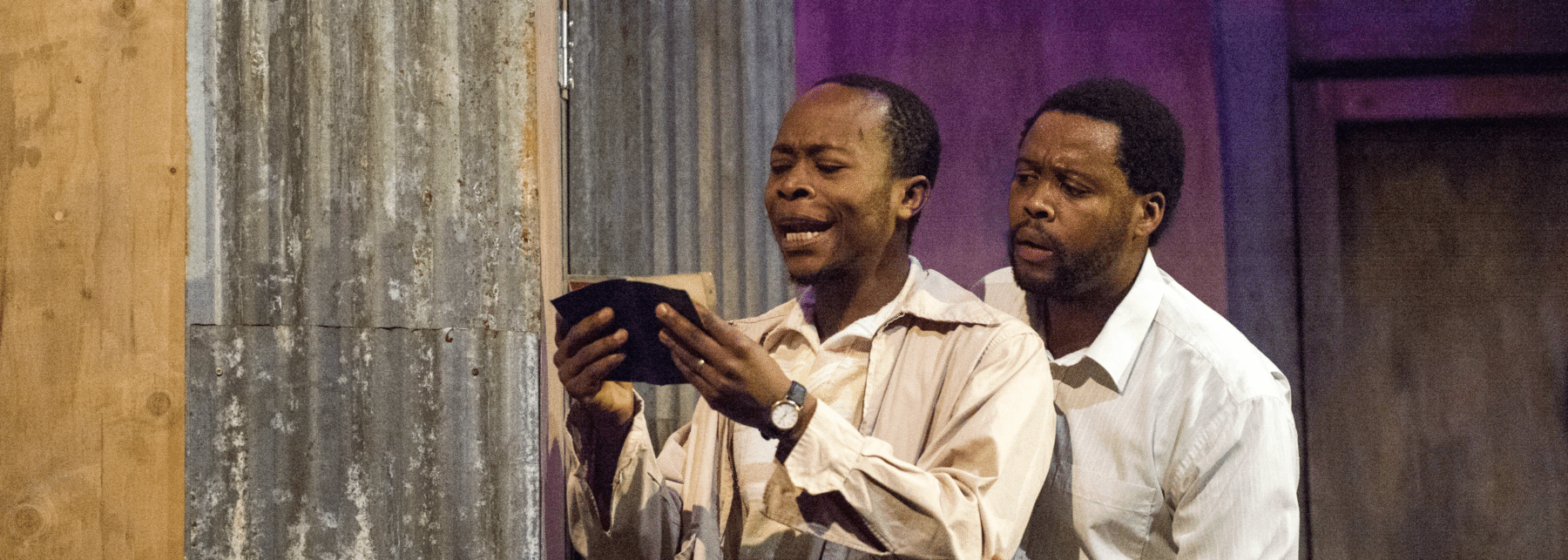Apartheid theatre divides
Sizwe Banzi is Dead explores the sacrifice of identity during the Apartheid in South Africa and was written collaboratively by Athol Fugard and two South African actors John Kani and Winston Ntshona. Forty years after its British Premiere at the Royal Court in 1974, the play is no less relevant or hard hitting today, in its current production at the Young Vic. It celebrates the resilience of the human spirit, while dealing with the harsh reality of survival in South Africa during the Apartheid era.
Sizwe Banzi is Dead tells the story of a man who walks into a photographic studio and introduces himself with uncertainty as Robert Zwelinzima. He is sending a photograph home to his wife with the message attached: ‘Sizwe Banzi is Dead!’ The truth of this message, and title of the play, is then gradually revealed to the audience. Having been given three days to leave Port Elizabeth by the authorities, and it being four days later, Sizwe Banzi is in trouble.
After a night out with his friend Buntu, a dead body is found… and a plan is formed. Buntu suggests swapping passbooks with the dead man, allowing Sizwe Banzi to stay and work in Port Elizabeth. At first he is reluctant about losing his name and identity, until he is reminded, ‘Your number is more important than your name.’ Sizwe Banzi becomes Robert Zwelinzima. The play ends with irresolution, questioning whether Sizwe Banzi really can defy the system by using another man’s name and what it means to lose a name in a time when your passbook means everything.
Arriving at the theatre, the audience is faced with signs in both English and Afrikaans, alongside a silent Police officer. ‘White’ and ‘Non-White’ are forced in different directions down the corridor to find seating split down the centre with ropes, enforcing segregation during the performance. Cleverly re-creating the situation of Apartheid-era South Africa, this division successfully left me feeling very uncomfortable. Sadly however, the tension created was broken by the difficulty of fitting everyone in to the unassigned seating, with ropes being moved around to fit everyone in, so the initial effect was somewhat forgotten.
The performance quickly redeemed itself from this glitch. It opened with the comedic monologue of Styles (Tonderai Munyevu) recounting a tale of his former job at a Ford car factory when a British boss paid a visit. Played with fantastic energy, Styles provided relief from the shock of segregation, while drawing the audience in to an awareness of the deeper truth of his words; the truth behind the false image of happy singing workers in South Africa, so often fed to other nations. This kind of clever black comedy was used throughout the performance. For instance, the dead body is discovered by Buntu, after having accidentally taken a piss on it. The audience are caught between laughter and anguish in these moments, which are fantastically brought out by Matthew Xia’s direction to show how Fugard’s play celebrates the strength of human spirit enduring in the Apartheid.
The lighting and set brilliantly capture the time and mood of the play. What first appears to be an old graphitised cupboard centre stage, opens up to reveal a tacky yet bright and happy photographic studio. Hyemi Shin’s set design is simply effective, allowing for changes in time and place with the swift closing of two panels.
The lighting, designed by Ciaran Cunningham, allows us to imagine the dark and dangerous streets of Port Elizabeth, and the bright optimism found in the photographic studio. The performance ends with a blinding, drawn-out flash of a photograph being taken, and the audience are left with the question of whether Sizwe Banzi’s (Sibusiso Mamba)
final position striding confidently forward is an optimistic step in to a new future, or a tragic loss of identity.
With so much more to say on the energetic, comedic and touching performances by Sibusiso Mamba and Tonderai Munyevu, as well the clever direction by Matthew Xia, I can only go on to strongly recommend everyone to go and see this thought-provoking play when it transfers to mac birmingham for a short run from Thursday 5 to Saturday 7 June – you won’t regret it.

Comments (1)